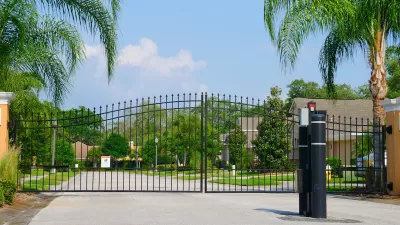Exclusionary zoning and land use tactics have a long history in the United States, retaining startling relevance in contemporary times. A deep investigation into Connecticut land use politics reveals just how entrenched these practices are.

Jacqueline Rabe Thomas explores Connecticut for lessons in how wealthy suburbs surround themselves "with invisible walls to block affordable housing and, by extension, the people who need it."
In a liberal state that has provided billions in taxpayer money to create more affordable housing, decisions at local zoning boards, the Connecticut Capitol and state agencies have thwarted court rulings and laws intended to remedy housing segregation. As far back as data has been kept, Connecticut’s low-income housing has been concentrated in poor cities and towns, an imbalance that has not budged over the last three decades.
The article starts with a single development anecdote from the city of Westport, but the article is also the vessel for sharing the findings for a larger study by the Connecticut Mirror and ProPublica that finds "more than three dozen Connecticut towns have blocked construction of any privately developed duplexes and apartments within their borders for the last two decades, often through exclusionary zoning requirements. In 18 of those towns, it’s been at least 28 years."
There is, however, a lot more relevant data and research to share, like evidence of the segregation of Connecticut neighborhoods, the long-term consequences of neighborhoods [pdf] for the social mobility of residents, and the high costs of living in neighborhoods with better schools.
A common narrative throughout all the political histories and research presented in this article: Democratic state leadership has allowed local control land use control to perpetuate sources of inequality. The Connecticut Governor Ned Lamont hasn't yet voiced support for changing the status quo.
FULL STORY: Separated by Design: How Some of America’s Richest Towns Fight Affordable Housing

Planetizen Federal Action Tracker
A weekly monitor of how Trump’s orders and actions are impacting planners and planning in America.

The Simple Legislative Tool Transforming Vacant Downtowns
In California, Michigan and Georgia, an easy win is bringing dollars — and delight — back to city centers.

San Francisco's School District Spent $105M To Build Affordable Housing for Teachers — And That's Just the Beginning
SFUSD joins a growing list of school districts using their land holdings to address housing affordability challenges faced by their own employees.

In More Metros Than You’d Think, Suburbs are Now More Expensive Than the City
If you're moving to the burbs to save on square footage, data shows you should think again.

The States Losing Rural Delivery Rooms at an Alarming Pace
In some states, as few as 9% of rural hospitals still deliver babies. As a result, rising pre-term births, no adequate pre-term care and "harrowing" close calls are a growing reality.

The Small South Asian Republic Going all in on EVs
Thanks to one simple policy change less than five years ago, 65% of new cars in this Himalayan country are now electric.
Urban Design for Planners 1: Software Tools
This six-course series explores essential urban design concepts using open source software and equips planners with the tools they need to participate fully in the urban design process.
Planning for Universal Design
Learn the tools for implementing Universal Design in planning regulations.
Smith Gee Studio
City of Charlotte
City of Camden Redevelopment Agency
City of Astoria
Transportation Research & Education Center (TREC) at Portland State University
US High Speed Rail Association
City of Camden Redevelopment Agency
Municipality of Princeton (NJ)





























